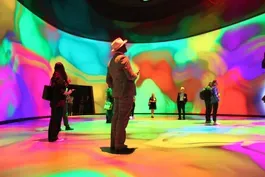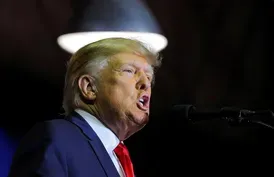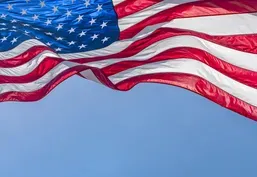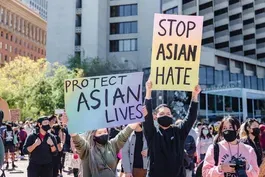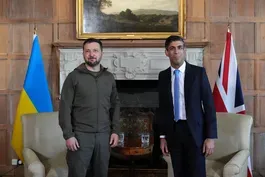
The roadblocks to holding Putin accountable for war crimes
Clip: 5/15/2023 | 7m 57sVideo has Closed Captions
The roadblocks to holding Putin and his high command accountable for war crimes in Ukraine
It has been almost two months since the International Criminal Court issued arrest warrants for Russian President Vladimir Putin and the official in charge of Moscow's campaign of stealing children from Ukraine. Nick Schifrin spoke with the top Biden administration official responsible for global criminal justice about her efforts and the chances of holding Putin and his high command accountable.
Problems with Closed Captions? Closed Captioning Feedback
Problems with Closed Captions? Closed Captioning Feedback
Major corporate funding for the PBS News Hour is provided by BDO, BNSF, Consumer Cellular, American Cruise Lines, and Raymond James. Funding for the PBS NewsHour Weekend is provided by...

The roadblocks to holding Putin accountable for war crimes
Clip: 5/15/2023 | 7m 57sVideo has Closed Captions
It has been almost two months since the International Criminal Court issued arrest warrants for Russian President Vladimir Putin and the official in charge of Moscow's campaign of stealing children from Ukraine. Nick Schifrin spoke with the top Biden administration official responsible for global criminal justice about her efforts and the chances of holding Putin and his high command accountable.
Problems with Closed Captions? Closed Captioning Feedback
How to Watch PBS News Hour
PBS News Hour is available to stream on pbs.org and the free PBS App, available on iPhone, Apple TV, Android TV, Android smartphones, Amazon Fire TV, Amazon Fire Tablet, Roku, Samsung Smart TV, and Vizio.
Providing Support for PBS.org
Learn Moreabout PBS online sponsorshipWILLIAM BRANGHAM: It's been almost two months since the International Criminal Court issued arrest warrants for Russian President Vladimir Putin and the official in charge of Moscow's campaign of stealing children from Ukraine.
Kyiv is demanding more international support to pursue Russian leadership.
Nick Schifrin spoke with the top Biden administration official who's responsible for global criminal justice about her efforts, the roadblocks within the American government, and the chances of holding Putin and his high command accountable.
NICK SCHIFRIN: In this war, death comes at night, as an apartment complex slept last month.
The death comes en masse, as Russia stole dignity from the dead and reduced cities to rubble.
And the killers are also thieves.
Kidnapped Ukrainian children are paraded in Moscow, forced to hug their abductors.
BETH VAN SCHAACK, U.S.
Ambassador at Large For Global Criminal Justice: This is a manifest violation of the U.N. Charter that has led to systemic war crimes, crimes against humanity across all areas where Russia's troops are deployed.
NICK SCHIFRIN: Beth Van Schaack is the U.S. ambassador at large for global criminal justice.
BETH VAN SCHAACK: We need to send a strong, concerted, unified international message that one cannot simply invade a sovereign neighbor in an effort to subjugate that neighbor and wipe them off the face of the planet.
JUDGE PIOTR HOFMANSKI, International Criminal Court (through translator): The International Criminal Court has issued two warrants of arrest.
NICK SCHIFRIN: The most prominent mechanism of justice is in The Hague at the ICC, which, in March, issued warrants for war crimes allegedly committed by Russian President Vladimir Putin and his so-called commission for children's rights.
ANDRIY KOSTIN, Prosecutor General of Ukraine: Systematically practiced torture and rape.
NICK SCHIFRIN: And U.N.'s prosecutor general is leading the country's own pursuit of close to 80,000 cases of war crimes committed by Russian soldiers in Ukraine.
VOLODYMYR ZELENSKYY, Ukrainian President: Ladies and gentlemen.
NICK SCHIFRIN: But Ukraine's President Volodymyr Zelenskyy wants Russia's leadership to be punished for its initial decision to wage war.
VOLODYMYR ZELENSKYY: Only one institution is capable of responding to the original crime, the crime of aggression, a tribunal.
NICK SCHIFRIN: The crime of aggression was created in the Nuremberg and Tokyo military tribunals after World War II for Nazi and Japanese leaders and hasn't been prosecuted by an international court since.
The ICC cannot pursue an aggression charge against Russian leadership because Russia is not an ICC member.
So, today, Ukraine demands a special tribunal that could pursue Putin authorized by the U.N. General Assembly.
VOLODYMYR ZELENSKYY: Not some compromise that will allow politicians to say that the case is allegedly done, but a true, really true, true, full-fledged tribunal, true and full justice.
NICK SCHIFRIN: That's direct criticism of a U.S. and Western European proposal, the Ukrainian court supported by international staff, money and intelligence with no U.N. authorization.
BETH VAN SCHAACK: The concern is that we don't have access to the Security Council here.
Of course, Russia will predictably -- predictably exercise its veto on any effort to create a stand-alone tribunal.
And, in the past, tribunals have generally been established by the Security Council.
And there are questions about whether the U.N. Charter empowers the General Assembly to do that.
NICK SCHIFRIN: Wouldn't the court that you're proposing operate under Ukrainian law and therefore be stuck with the rule that a national court cannot go after the head of state of another country?
BETH VAN SCHAACK: The vision is a court that is deeply rooted in the Ukrainian national system.
They will be starting to build dossiers against all of those individuals in a leadership capacity who were in a position to design, execute the crimes of aggression committed within Ukraine.
And this tribunal could then accept those indictments when the time was ripe to confirm those charges.
NICK SCHIFRIN: Does that suggest that, regardless of the format, you don't see any accountability for Putin himself until he's out of power?
BETH VAN SCHAACK: Under any scenario, we're going to have to have custody of the accused, of Putin, in order to move forward.
And that's exceedingly unlikely until there is some sort of a political transformation within Russia.
NICK SCHIFRIN: The U.S. also has a practical problem.
Many countries in the global South wouldn't vote to establish a tribunal, in part because they accused the U.S. of double standards for refusing to submit to ICC investigations over the American wars in Iraq and Afghanistan.
BETH VAN SCHAACK: With Ukraine really interested, for obvious reasons, to have the international community backing this effort, backing this initiative wholeheartedly, to come out of this -- of the General Assembly resolution with a weaker vote than 90 or 80 states in train would be problematic.
I think that would really undercut the message of legitimacy.
SEN. LINDSEY GRAHAM (R-SC): The Department of Justice has been great.
The Department of Defense has been terrible.
NICK SCHIFRIN: There's another way for the U.S. to pursue justice, help the ICC.
Late last year, Senate Judiciary Committee leaders, Ranking Member Republican Lindsey Graham and Chair Democrat Dick Durbin, helped lead an effort to change the law to allow the U.S., which isn't an ICC member, to provide the ICC with intelligence, funding and staffing for its Ukraine investigations.
NICK SCHIFRIN: Why hasn't the administration done that?
BETH VAN SCHAACK: We are still exploring how we can utilize these new authorities from Congress.
It's still a matter of working through some of the details through the interagency process.
NICK SCHIFRIN: Multiple U.S. officials tell "PBS NewsHour" the Defense Department rejects helping the ICC hold Russian soldiers accountable, out of fear the ICC could one day prosecute U.S. soldiers.
The officials say the intelligence community has dropped its own previous concerns.
Last week, after a meeting with ICC Prosecutor General Karim Khan, Durbin accused the administration of -- quote -- "withholding evidence" from the ICC.
SEN. RICHARD DURBIN (D-IL): Why is your department not sharing evidence that we have gathered to help that effort?
LLOYD AUSTIN, U.S. Secretary of Defense: I do have concerns about reciprocity going forward, I remain concerned about the protection of U.S. military personnel.
(CROSSTALK) SEN. RICHARD DURBIN: I have got to ask for more, General.
I respect you and I voted for you, and I would do it again.
But I got to ask for more.
If the law says cooperate, and you refuse, what am I -- what conclusion am I supposed to draw?
LLOYD AUSTIN: We support the goal of holding Russia accountable.
SEN. RICHARD DURBIN: I have to ask you to prove it by doing so.
You have drawn a personal opposite conclusion.
And I think it is, frankly, hurting the efforts to hold Putin accountable.
NICK SCHIFRIN: And, last month, Graham raked Deputy Attorney General Lisa Monaco over the coals for not complying with the new law.
SEN. LINDSEY GRAHAM: I want to ask you again, is the Department of Defense the holdup?
LISA MONACO, U.S. Deputy Attorney General: Senator, I know the Department of Defense has had longstanding concerns about our engagement.
The department... SEN. LINDSEY GRAHAM: I don't care what their concerns are.
They can share them with me.
We have got a law on the books.
Do you feel like you need to follow the law when you're told to do it?
LISA MONACO: Yes, Senator.
SEN. LINDSEY GRAHAM: OK.
So we won't -- we will take this up with the Department of Defense.
NICK SCHIFRIN: Should the Department of Defense be worried about future prosecutions if it drops its resistance?
BETH VAN SCHAACK: I think there is virtually no equivalency or comparison to what Russia has done here to anything that might involve U.S. personnel or service members.
We have a full-scale war of aggression being committed through the systematic and widespread commission of war crimes, crimes against humanity.
There's no comparison here.
And so I do not see a concern that this would set any sort of a precedent that might redound badly to the United States.
NICK SCHIFRIN: So the debate over ICC assistants and the special tribunal continues, as Ukraine demands accountability and justice for Russia's ongoing crimes.
For the "PBS NewsHour," I'm Nick Schifrin.
American Museum of Natural History opens stunning new wing
Video has Closed Captions
Clip: 5/15/2023 | 7m 21s | American Museum of Natural History opens stunning new expansion (7m 21s)
Durham report criticizes FBI for Trump-Russia investigation
Video has Closed Captions
Clip: 5/15/2023 | 4m 50s | Durham report criticizes FBI investigation into Trump campaign's possible ties to Russia (4m 50s)
A look at battles over abortion rights at the state level
Video has Closed Captions
Clip: 5/15/2023 | 11m 11s | A look at primary elections and battles over abortion rights at the state level (11m 11s)
Sen. Klobuchar invites readers into her personal life
Video has Closed Captions
Clip: 5/15/2023 | 7m 17s | Sen. Klobuchar's 'The Joy of Politics' invites readers into her personal life (7m 17s)
Survey of Asian Americans paints sobering picture of fears
Video has Closed Captions
Clip: 5/15/2023 | 5m 54s | Survey of Asian Americans paints sobering picture of fears about violence (5m 54s)
Zelenskyy tours Europe to secure aid in fight against Russia
Video has Closed Captions
Clip: 5/15/2023 | 3m 26s | Zelenskyy tours Europe to secure more military aid in Ukraine's fight against Russia (3m 26s)
Providing Support for PBS.org
Learn Moreabout PBS online sponsorshipSupport for PBS provided by:
Major corporate funding for the PBS News Hour is provided by BDO, BNSF, Consumer Cellular, American Cruise Lines, and Raymond James. Funding for the PBS NewsHour Weekend is provided by...
